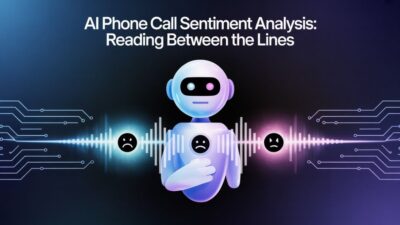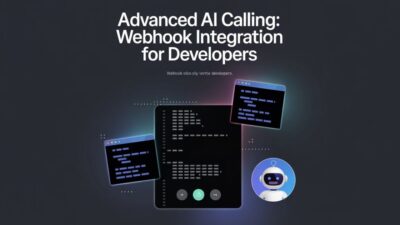Introduction
Picture this: Your car gets damaged in a parking lot. Instead of dreading the insurance claim process, you simply call your insurer and have an intelligent AI system walk you through everything in minutes. No hold times, no transferred calls, no frustration. Just quick, efficient service that gets your life back on track.
Table of Contents
This isn’t science fiction – it’s happening right now. Insurance AI claim calls are revolutionizing how people report accidents, file claims, and get the help they need during stressful times. The insurance companies embracing this technology aren’t just cutting costs; they’re creating customer experiences that make people happy to deal with insurance.
But how exactly does AI transform insurance claims? And more importantly, what does this mean for you as a customer or insurance professional? Let’s dive into the world of AI-powered insurance claims and discover why this technology is changing everything.
The Old Insurance Claims Nightmare
Anyone who’s filed an insurance claim knows the traditional process can be a nightmare. You’re already stressed from an accident or disaster, and then you face:
Endless Hold Times: Calling during peak hours means waiting 20-45 minutes just to speak with someone. During major weather events or widespread incidents, wait times can stretch to hours.
Multiple Transfers: “Let me transfer you to our claims department. You need auto claims… Hold on, let me get you to the right specialist.” Each transfer means explaining your situation all over again.
Inconsistent Information: Different representatives give different answers. One person says your claim is covered, another questions it. You’re never sure what to believe.
Limited Availability: Traditional claims departments operate during business hours. But accidents don’t follow a 9-to-5 schedule. Getting hit by a drunk driver at 11 PM on Saturday? Good luck reaching anyone until Monday morning.
Human Error: Tired representatives make mistakes. Information gets recorded incorrectly, important details are missed, and simple errors can delay your claim for weeks.
Emotional Stress: Dealing with claims adjusters who seem skeptical or rushed adds insult to injury when you’re already dealing with damage to your property or vehicle.
The result? Customers who dread calling their insurance company often delay reporting claims, making the entire process more complicated and expensive for everyone involved.
How Insurance AI Claim Calls Change Everything
AI-powered insurance claims systems flip this entire experience on its head. Instead of fighting through a broken system, customers get immediate, intelligent assistance that actually works.
Instant Availability, 24/7
Insurance AI claim calls never sleep. Whether you’re in a fender-bender at 3 AM or discover flood damage on Christmas morning, AI systems are ready to help immediately. No hold times, no “our offices are currently closed” messages – just instant support when you need it most.
This immediate availability isn’t just convenient; it’s crucial for proper claims handling. The sooner claims are reported, the more accurate the information tends to be. Memories fade, evidence disappears, and witnesses become harder to locate as time passes.
Consistent, Accurate Information Gathering
Human representatives have bad days, get tired, and sometimes forget to ask important questions. AI systems follow the same comprehensive checklist every single time. They’re programmed to gather all necessary information systematically, ensuring nothing important gets missed.
The AI doesn’t judge your story or question your credibility – it simply collects facts and documents everything accurately. This consistency means fewer follow-up calls, less confusion, and faster claim resolution.
Intelligent Question Flow
Unlike rigid phone trees that force you through irrelevant options, AI systems adapt their questions based on your specific situation. If you mention it’s a single-car accident, the AI won’t waste time asking about the other driver. If you report a break-in, it automatically focuses on theft-related questions.
This intelligent questioning makes the process feel more like a natural conversation with a knowledgeable professional rather than a bureaucratic interrogation.
Immediate Preliminary Assessment
Advanced AI systems can provide preliminary coverage assessments during the initial call. By analyzing your policy details and the incident information in real-time, they can often tell you immediately whether your claim is likely to be covered and what your next steps should be.
This instant feedback reduces anxiety and helps you make informed decisions about repairs, rentals, and other immediate needs.
Real-World Benefits: What Customers Experience
The theoretical advantages of AI sound great, but what do customers experience when they use insurance AI claim calls?
Sarah’s Auto Accident Story
Sarah rear-ended another car during her morning commute. Shaken but uninjured, she called her insurance company from the scene. Instead of waiting on hold while traffic backed up around her, an AI system answered immediately.
The AI guided her through documenting the scene, taking photos, exchanging information with the other driver, and even helped her determine whether she needed a tow truck. Within 8 minutes, her claim was filed, she had a claim number, and the AI had scheduled an adjuster to inspect her car the next day.
“I was amazed,” Sarah said. “I expected to spend my lunch break on hold with insurance. Instead, everything was handled before the tow truck even arrived.”
Mike’s Home Insurance Experience
When Mike discovered water damage in his basement after a storm, he called his homeowner’s insurance at 10 PM on a Sunday. The AI system immediately began documenting the damage, asking detailed questions about the affected areas and potential causes.
The AI also provided immediate guidance on preventing further damage – advising Mike to document everything with photos, move valuables to dry areas, and contact specific water restoration companies in his area. A human adjuster was scheduled for first thing Monday morning, but Mike had clear direction on protecting his property over the weekend.
Jennifer’s Quick Windshield Claim
Jennifer’s windshield was cracked by road debris during her road trip. The AI system not only filed her claim instantly but also located approved glass repair shops in her current city, checked their availability, and even scheduled her appointment – all during a 5-minute phone call.
The entire process, from initial call to completed repair, took less than 24 hours. “I’ve never had such an efficient insurance experience,” Jennifer noted. “It made me feel good about my insurance company instead of frustrated.”
The Technology Behind Insurance AI Claim Calls
Understanding how these systems work helps explain why they’re so much more effective than traditional approaches.
Natural Language Processing
Modern insurance AI doesn’t require you to speak in robotic phrases or navigate complex menu systems. You can describe your situation naturally: “Some idiot backed into my car at the grocery store” or “There’s water all over my kitchen floor and I don’t know where it’s coming from.”
The AI understands context, emotion, and even unclear descriptions, translating your natural speech into the specific information needed for claims processing.
Integration with Policy Systems
AI systems instantly access your complete policy information during the call. They know your coverage limits, deductibles, recent claims history, and any special conditions in your policy. This immediate access means more accurate assessments and fewer unpleasant surprises later in the process.
Dynamic Decision Trees
Traditional phone systems follow rigid scripts, but AI adapts to each unique situation. If you mention injuries, the system immediately prioritizes medical information and connects you with appropriate resources. If it’s purely property damage, it focuses on repair and replacement processes.
This adaptability makes each conversation more relevant and efficient.
Real-Time Data Analysis
While you’re speaking, the AI is analyzing patterns in your claim against millions of similar cases. It can identify potential fraud indicators, estimate likely costs, and predict processing timelines – all before the call ends.
This analysis helps insurance companies process claims faster while maintaining appropriate oversight and fraud prevention.
Seamless Human Handoff
When situations require human expertise, AI systems don’t just transfer you randomly. They analyze the specifics of your case and connect you with the most appropriate specialist, providing that person with a complete summary of your conversation and situation.
The human representative starts the conversation already informed, eliminating the need to repeat your story.
Benefits for Insurance Companies
While customers love the improved experience, AI-powered claims systems also provide significant advantages for insurance companies themselves.
Reduced Operating Costs
AI systems handle routine claims without human intervention, allowing insurance companies to process more claims with fewer staff members. This cost reduction can be passed on to customers through lower premiums or invested in better coverage options.
Improved Accuracy
Human errors in claims processing cost insurance companies millions annually. AI systems eliminate most transcription errors, missed information, and incorrect assessments, leading to more accurate claims handling and fewer costly mistakes.
Faster Fraud Detection
AI systems excel at pattern recognition, identifying potential fraud indicators much faster than human reviewers. This rapid detection prevents fraudulent payouts while ensuring legitimate claims move through the system quickly.
Better Resource Allocation
By handling routine claims automatically, AI frees up experienced human adjusters to focus on complex cases that truly require expertise. This improved resource allocation leads to better outcomes for both simple and complicated claims.
Enhanced Customer Retention
Customers who have positive claims experiences are much more likely to renew their policies and recommend their insurance company to others. AI-powered systems create these positive experiences consistently, improving customer loyalty and reducing marketing costs.
Industry-Specific Applications
Different types of insurance benefit from AI claims processing in unique ways.
Auto Insurance
Auto insurance AI excels at gathering accident details, coordinating with repair shops, and managing rental car arrangements. The systems can even analyze photos of vehicle damage to provide preliminary repair estimates during the initial call.
Key Features: Automatic accident reconstruction based on descriptions, integration with preferred repair networks, real-time rental car booking, and immediate coverage verification.
Homeowner’s Insurance
Property damage claims often involve complex assessments and multiple contractors. AI systems help coordinate these various elements while ensuring all necessary documentation is collected systematically.
Key Features: Weather data correlation for storm damage, contractor network integration, temporary living expense calculations, and restoration timeline estimation.
Health Insurance
Medical claims involve complex coverage rules and provider networks. AI systems can navigate these complexities instantly, helping patients understand their benefits and locate appropriate care providers.
Key Features: Real-time benefit verification, provider network searches, pre-authorization handling, and treatment cost estimation.
Commercial Insurance
Business insurance claims often involve multiple coverage types and complex loss calculations. AI systems help organize these multifaceted claims while ensuring all relevant policies are considered.
Key Features: Multi-policy analysis, business interruption calculations, liability assessment coordination, and regulatory compliance checking.
Overcoming Common Concerns
Despite the clear benefits, some people have concerns about AI handling their insurance claims. Let’s address the most common worries.
“I Want to Talk to a Real Person”
AI systems don’t replace human interaction – they enhance it. When you need human expertise, the AI ensures you’re connected with the right person who already understands your situation. Many customers find they get better human service because the AI has already gathered all the basic information.
“What About Complex Situations?”
AI systems are designed to recognize when cases exceed their capabilities. Complex claims involving injuries, disputes, or unusual circumstances are immediately escalated to human experts. The difference is that simple, straightforward claims no longer consume resources that should be dedicated to complex cases.
“Can AI Really Understand My Situation?”
Modern AI systems are surprisingly sophisticated at understanding context, emotion, and nuance. They’re trained on millions of real claims conversations and continue learning from each interaction. In many cases, customers report that AI systems seem more attentive and thorough than busy human representatives.
“What About Privacy and Security?”
AI systems follow the same strict privacy and security protocols as human representatives. They often provide better security because they eliminate human error in data handling and maintain complete audit trails of all interactions.
The Future of Insurance AI Claim Calls
Current AI systems are impressive, but upcoming developments will make them even more powerful and helpful.
Visual Damage Assessment
Soon, AI systems will be able to analyze photos and videos in real-time during calls, providing instant damage assessments and repair estimates. Customers will simply point their phone camera at the damage while talking to the AI system.
Predictive Claims Processing
Advanced AI will predict likely claim outcomes and proactively gather necessary documentation, reducing the back-and-forth typically required for claim resolution.
Multi-Language Support
AI systems will handle claims in dozens of languages with native-level fluency, making insurance more accessible to diverse populations.
Integration with Smart Devices
Connected cars, smart home devices, and wearable technology will automatically provide claim-relevant data to AI systems, creating even more seamless claim experiences.
Emotional Intelligence
Future AI systems will better recognize customer stress and adjust their communication style accordingly, providing more empathetic and supportive interactions during difficult times.
Best Practices for Using Insurance AI Claim Calls
To get the most benefit from AI-powered claims systems, customers should follow these best practices:
Be Prepared with Key Information
Have your policy number, date, and time of the incident, and basic details ready. While AI systems are patient, having information organized speeds up the process.
Speak Naturally
Don’t try to use formal language or insurance jargon. AI systems understand natural speech better than stilted, formal descriptions.
Be Comprehensive
Share all relevant details, even if they seem minor. AI systems can process large amounts of information quickly and identify important patterns you might miss.
Ask Questions
Don’t hesitate to ask the AI system to explain coverage details, next steps, or anything else you don’t understand. These systems are designed to educate as well as assist.
Document Everything
Take photos, keep receipts, and maintain records as the AI system recommends. This documentation speeds up the entire claims process.
Choosing Insurance Companies with AI Claims
As AI becomes more common in insurance, customers should consider claims processing capabilities when choosing providers.
Questions to Ask
When evaluating insurance companies, ask about their AI claims capabilities:
- Do they offer 24/7 AI-powered claims reporting?
- How quickly can their AI systems provide preliminary assessments?
- What types of claims can be handled entirely through AI?
- How do they handle the transition from AI to human representatives when needed?
Red Flags to Avoid
Be cautious of insurance companies that:
- Still rely entirely on traditional phone systems with long hold times
- Don’t offer after-hours claims reporting
- Have no clear integration between their claims systems and customer service
- Haven’t invested in modern technology infrastructure
Making the Switch: What to Expect
If you’re moving from traditional insurance claims to AI-powered systems, here’s what to expect during the transition:
Initial Adjustment Period
Your first AI claims call might feel different from traditional interactions. This is normal – most customers adapt quickly and appreciate the efficiency.
Improved Follow-Up
AI systems excel at follow-up communication, providing regular updates on claim status and next steps without requiring you to call and check.
More Control
Many AI systems provide online portals where you can track claim progress, upload additional documentation, and communicate with adjusters, giving you more control over the process.
Faster Resolution
Most customers see significantly faster claim resolution times with AI systems, often cutting processing time in half or more for routine claims.
Read More: Why AI Calls Are The Future Of Phone-Based Customer Support
Conclusion

Insurance AI claim calls represent more than just technological advancement – they represent a fundamental shift toward customer-centric insurance services. Instead of making customers adapt to insurance company processes, AI adapts to customer needs.
The result is an insurance industry that serves its customers effectively during their most stressful moments. When your car is damaged, your home is flooded, or you’re injured in an accident, you shouldn’t have to fight with your insurance company for basic service.
AI-powered claims systems ensure that insurance companies can fulfill their core promise: being there when you need them most. They transform insurance from a necessary evil into a valuable service that customers can count on.
For insurance companies, AI claims processing isn’t just about cutting costs – it’s about building the kind of customer relationships that create long-term business success. Happy customers renew policies, refer friends, and choose higher coverage levels. They become advocates instead of adversaries.
The insurance companies embracing AI claims technology today are positioning themselves as industry leaders tomorrow. They’re not just processing claims faster; they’re building the foundation for the future of insurance customer service.
The transformation is already happening. Forward-thinking insurance companies are implementing AI claims systems, and customers are experiencing the benefits immediately. As this technology becomes standard across the industry, the old model of frustrating insurance interactions will become a relic of the past.
Whether you’re a customer tired of insurance hassles or an insurance professional looking to improve your company’s service, AI-powered claims processing offers a clear path toward better outcomes for everyone involved. The future of insurance claims is here, and it’s smarter, faster, and more customer-friendly than ever before.





